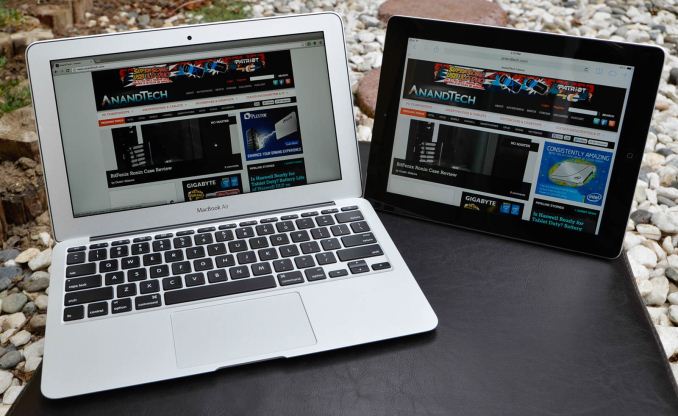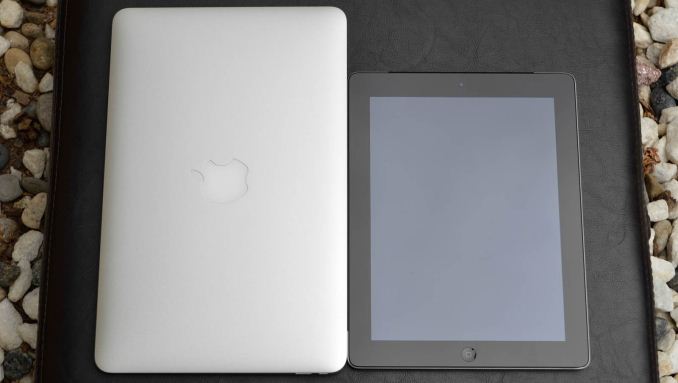The 2013 MacBook Air Review (11-inch)
by Vivek Gowri on August 9, 2013 1:45 AM ESTSince the last time the iPad versus MacBook Air 11” comparison was brought up, both products have improved and evolved tremendously, the iPad more so than the Air. It’s easy to dismiss even making the connection (because who here actually cross-shops a high-end ARM tablet with a mid-range ultraportable, raise of hands please) but I think there are enough shared attributes to make a discussion worthwhile, especially considering the similarity in terms of form factor and now battery life. If I was looking for an extremely compact, thin, light, and long-lasting companion device to bring on a trip, they’re both completely valid answers. But which would I actually take?
The short answer would almost always be the Air, for a variety of reasons, but I’ll get there. This basically goes back to the tablet versus notebook conversation for various usecases. The iPad is awesome as a travel device, as are most tablets in general, and you can see evidence of this in any airport terminal. Especially after the screen upgrade last year, the iPad is hands down one of the best content consumption devices on the market. It’s also my absolute favorite digital platform for reading. I’ll actually save lengthy articles, like some AnandTech reviews and other long-form content from other websites I enjoy, to read on my iPad. Between the sharpness of text on the Retina display and the physical closeness you have with the words, it’s about the closest you can get to a paper reading experience on an LCD. (This also holds true for any high-DPI tablet, including the Nexus 7.2, Nexus 10, Surface Pro, and others). Also, the ability to use a tablet with only one hand, not needing a platform of some kind, and general versatility of physical handling adds a convenience factor that’s hard to get from a notebook.
But when the tablet doesn’t have an inherent advantage in terms of size or battery life, it’s a lot harder to justify skipping the sheer versatility and power you get out of a real notebook computer, even a small one, for reasons that amount to the tablet being easier to use while standing up. The notebook is basically better at everything other than reading, and there’s far more computing horsepower at your disposal. You have far more control over everything that happens—media, browsing, documents, you name it. And there’s a real, physical keyboard, so in terms of productivity, there’s just not a conversation. To some degree, that’s always been something that held tablets back for me and I suspect the other editors on staff. Admittedly, our usecases typically involve a lot of writing and email, neither of which is easy at all without a hardware keyboard, so we’re probably not the right target demographic to judge tablets by.
The capabilities of a Core i5-based ultraportable are so far beyond that of an iPad or Nexus 10 though, which is part of what makes this on the surface a somewhat odd comparison to be making. Obviously the tablets are cheaper, though it’s worth pointing out that a 128GB iPad (WiFi) is only $200 less than a 128GB Air 11”, and as noted earlier the iPad keyboards typically run $100. I don’t know why anyone would need that much storage on an iPad, maybe if you had a ton of 1080p video content that you really needed to carry with you everywhere. The 16 and 32GB iPads, at $499 and 599, are obviously far more accessible and probably more sensible investments.
I’m not trying to recommend that people buy the Air over the iPad, just that it’s possible to do so with very little compromise. It wasn’t really something you could do until now simply because of battery life, but with Haswell ULT boasting similar or better power efficiency than high-end ARM SoCs in light everyday CPU-driven workloads, it’s certainly something to think about. I think the best of both worlds situation is yet to come, possibly with something that looks like a thinner, Haswell-based Surface Pro with Windows 8.1 and significantly better battery life than we’ve seen out of Ivy Bridge tablets in the last year.












139 Comments
View All Comments
darwinosx - Friday, August 9, 2013 - link
Haven't gotten any faster? Did you read how fast the ssd is?antonio22m - Friday, August 16, 2013 - link
Air is perfect and the best "second computer" that you can wish for.Take a look at this comparison at http://www.squidoo.com/apple-macbook-air-133 and You will see comparison to the another Apple laptops.Anyone considering purchasing this laptop needs to see the information in this chart.
BryanDobbins - Saturday, August 17, 2013 - link
my classmate's half-sister makes $88 every hour on the computer. She has been without a job for six months but last month her pay was $21529 just working on the computer for a few hours. Read more on this site... http://xurl.es/mcdufxTRICKYxx - Friday, August 9, 2013 - link
Damn, that is awesome battery life. It almost makes me want to sell my 2012 MBP... But, its the heavy workloads that make my battery tank. For the most part, its the discrete GPU's fault.Could you guys do a light gaming test? How long will Minecraft last for these guys?
xTRICKYxx - Friday, August 9, 2013 - link
Using HD 4000 graphics, I can get around 2.5 hours of gaming. It would be pretty cool to have a more portable gaming experience.solipsism - Friday, August 9, 2013 - link
I would wait for the 2013 MBPs to drop before making a decision. I assume going to the Air wouldn't be a great move if you like the performance, ports, storage, and display the MBP offers that the Air cannot.I suspect they will arrive by October with TB2 being a holdup. Same for the new Mac Pro. I also assume Apple will have a 4K (or higher) replacement to their 27" display, which may be 30.5" if other vendors are anything to go by.
name99 - Saturday, August 10, 2013 - link
TB2 may be the holdup.But what is the status of 3x3:3 802.11ac chips? Obviously we have ones that are good enough for a base station, but maybe the lower power ones that you'd want in a laptop aren't available yet, and Apple doesn't want to ship with 2x2:2. (Though I assume they will if necessary, that they have that as a plan B if the 3x3:3 ships delay too long.)
It's worth noting that the other obvious MIA is the new Mac Mini. That COULD ship with a power-hungry 802.11ac chip, but would be embarrassing for Apple because they have made a big deal in the past about how low-power it is.
The Mac Mini suggests that the delay is not in any way screen related (eg waiting for a cheaper retina screen, so the whole line is rMBP, or waiting for a lower power retina screen.)
It seems likely, IMHO, that both MBPs and Minis are being delayed by a part, not just for the sake of scheduling, because when they do get released they're going to make Apple's revenues even more volatile. If they could have been released last quarter or this quarter, they would have upped revenues (which were down because of no new iOS devices). Shipping in Fall means they're going to pump up the already high revenues from iPhone 5x and iPad new, and make Apple look even more manic depressive, going from a slow Q1 to a blowout Q3 and Q4.
vFunct - Friday, August 9, 2013 - link
These Airs really do need LTE connectivity built in.Scannall - Friday, August 9, 2013 - link
I agree. I'm surprised it isn't an option yet.name99 - Saturday, August 10, 2013 - link
The general consensus on this point is that while iOS was built from the ground up to "monitor" networking and carefully use the cellular network only to the bare minimum (so delaying non-critical network ops until they can maybe go out over WiFi) OSX is a more traditional model of saying whatever it wants (in a more chatty fashion) whenever it wants.Users of the LTE might be upset that their data usage vastly exceeds what they expected, given iOS experience.
Reading between the lines of the work that has been done for Mavericks (eg all the work bunching stuff which is nominally to save power) it is possible, even likely, that they are gradually moving the iOS code into OSX, and when that is ready the LTE models will ship.
(It's also possible that there is a kind of hardball negotiation going on here between Apple and the telcos. Obviously Apple, as advocate of its customers, would like the telcos to offer plans along the lines of "2GB of data, used however you damn well like, across whatever devices you damn well like". The telcos would obviously prefer their various current models (which all involve paying a hell of a high monthly fee for separate devices, regardless of exactly how that extra per device fee is calculated or named). But whichever one breaks first has the chance to pull an ATT and sweep up a huge pool of the most desirable customers. When that telco [Sprint or T-Mobile most likely] caves is when Apple will ship with LTE?)